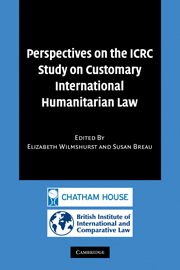Book contents
- Frontmatter
- Contents
- Preface
- List of contributors
- Table of cases
- Table of treaties and other instruments
- Abbreviations
- Part 1 Setting the scene: Theoretical perspectives on international law in the ICRC Study
- 1 The methodological framework of the Study
- 2 The approach to customary international law in the Study
- 3 Other areas of customary law in relation to the Study
- Part 2 The status of conflict and combatants: The ICRC Study
- Part 3 Commentary on selected Rules from the ICRC Study
- Part 4 Conclusions
- Index
1 - The methodological framework of the Study
Published online by Cambridge University Press: 09 July 2009
- Frontmatter
- Contents
- Preface
- List of contributors
- Table of cases
- Table of treaties and other instruments
- Abbreviations
- Part 1 Setting the scene: Theoretical perspectives on international law in the ICRC Study
- 1 The methodological framework of the Study
- 2 The approach to customary international law in the Study
- 3 Other areas of customary law in relation to the Study
- Part 2 The status of conflict and combatants: The ICRC Study
- Part 3 Commentary on selected Rules from the ICRC Study
- Part 4 Conclusions
- Index
Summary
Introduction
The Study on Customary International Humanitarian Law (the Study) took a decade to complete. By any standards, it is a significant contribution to the learning on, and the development of, international humanitarian law. Three volumes, 5,000 pages, 161 Rules and commentaries and supporting materials: it is a remarkable feat. All those associated with the preparation of the Study are to be congratulated. They have brought us closer to the heart of international humanitarian law – the actual practice of States.
In his foreword to the Study, Yves Sandoz observed as follows:
The Study is a still photograph of reality, taken with great concern for absolute honesty, that is, without trying to make the law say what one wishes it would say. I am convinced that this is what lends the study international credibility. But though it represents the truest possible reflection of reality, the study makes no claim to be the final word. It is not all-encompassing – choices had to be made – and no-one is infallible. In the introduction to De jure belli ac pacis, Grotius says this to his readers: ‘I beg and adjure all those into whose hands this work shall come, that they assume towards me the same liberty that I have assumed in passing upon the opinions and writings of others.’ What better way to express the objectives of those who have carried out this study? May it be read, discussed and commented on.
- Type
- Chapter
- Information
- Publisher: Cambridge University PressPrint publication year: 2007
- 1
- Cited by

